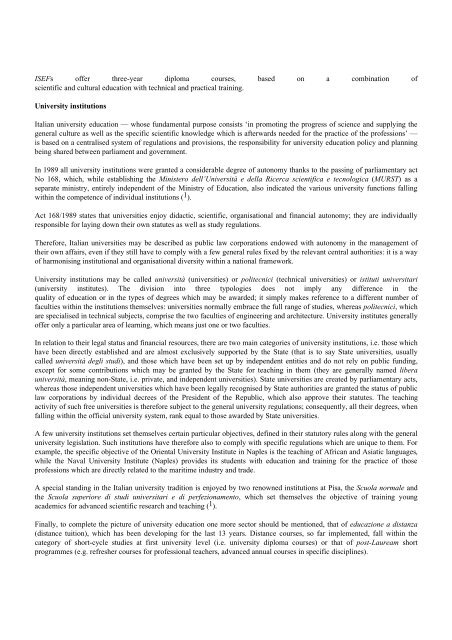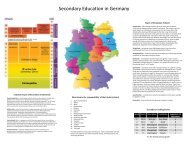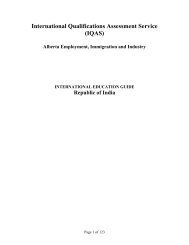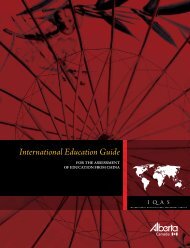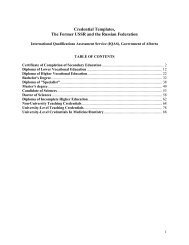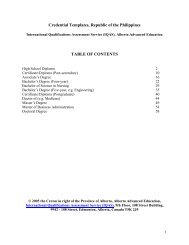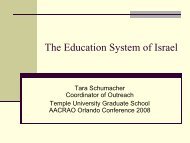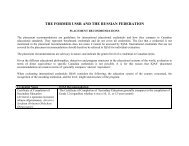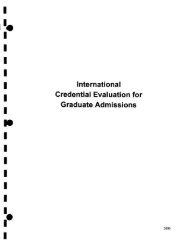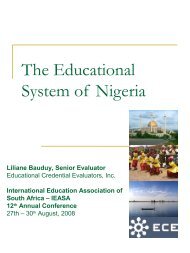NARIC guide on Higher Education Systems in the European Union
NARIC guide on Higher Education Systems in the European Union
NARIC guide on Higher Education Systems in the European Union
You also want an ePaper? Increase the reach of your titles
YUMPU automatically turns print PDFs into web optimized ePapers that Google loves.
ISEFs offer three-year diploma courses, based <strong>on</strong> a comb<strong>in</strong>ati<strong>on</strong> of<br />
scientific and cultural educati<strong>on</strong> with technical and practical tra<strong>in</strong><strong>in</strong>g.<br />
University <strong>in</strong>stituti<strong>on</strong>s<br />
Italian university educati<strong>on</strong> — whose fundamental purpose c<strong>on</strong>sists ‘<strong>in</strong> promot<strong>in</strong>g <strong>the</strong> progress of science and supply<strong>in</strong>g <strong>the</strong><br />
general culture as well as <strong>the</strong> specific scientific knowledge which is afterwards needed for <strong>the</strong> practice of <strong>the</strong> professi<strong>on</strong>s’ —<br />
is based <strong>on</strong> a centralised system of regulati<strong>on</strong>s and provisi<strong>on</strong>s, <strong>the</strong> resp<strong>on</strong>sibility for university educati<strong>on</strong> policy and plann<strong>in</strong>g<br />
be<strong>in</strong>g shared between parliament and government.<br />
In 1989 all university <strong>in</strong>stituti<strong>on</strong>s were granted a c<strong>on</strong>siderable degree of aut<strong>on</strong>omy thanks to <strong>the</strong> pass<strong>in</strong>g of parliamentary act<br />
No 168, which, while establish<strong>in</strong>g <strong>the</strong> M<strong>in</strong>istero dell’Università e della Ricerca scientifica e tecnologica (MURST) as a<br />
separate m<strong>in</strong>istry, entirely <strong>in</strong>dependent of <strong>the</strong> M<strong>in</strong>istry of Educati<strong>on</strong>, also <strong>in</strong>dicated <strong>the</strong> various university functi<strong>on</strong>s fall<strong>in</strong>g<br />
with<strong>in</strong> <strong>the</strong> competence of <strong>in</strong>dividual <strong>in</strong>stituti<strong>on</strong>s ( 1 ).<br />
Act 168/1989 states that universities enjoy didactic, scientific, organisati<strong>on</strong>al and f<strong>in</strong>ancial aut<strong>on</strong>omy; <strong>the</strong>y are <strong>in</strong>dividually<br />
resp<strong>on</strong>sible for lay<strong>in</strong>g down <strong>the</strong>ir own statutes as well as study regulati<strong>on</strong>s.<br />
Therefore, Italian universities may be described as public law corporati<strong>on</strong>s endowed with aut<strong>on</strong>omy <strong>in</strong> <strong>the</strong> management of<br />
<strong>the</strong>ir own affairs, even if <strong>the</strong>y still have to comply with a few general rules fixed by <strong>the</strong> relevant central authorities: it is a way<br />
of harm<strong>on</strong>is<strong>in</strong>g <strong>in</strong>stituti<strong>on</strong>al and organisati<strong>on</strong>al diversity with<strong>in</strong> a nati<strong>on</strong>al framework.<br />
University <strong>in</strong>stituti<strong>on</strong>s may be called università (universities) or politecnici (technical universities) or istituti universitari<br />
(university <strong>in</strong>stitutes). The divisi<strong>on</strong> <strong>in</strong>to three typologies does not imply any difference <strong>in</strong> <strong>the</strong><br />
quality of educati<strong>on</strong> or <strong>in</strong> <strong>the</strong> types of degrees which may be awarded; it simply makes reference to a different number of<br />
faculties with<strong>in</strong> <strong>the</strong> <strong>in</strong>stituti<strong>on</strong>s <strong>the</strong>mselves: universities normally embrace <strong>the</strong> full range of studies, whereas politecnici, which<br />
are specialised <strong>in</strong> technical subjects, comprise <strong>the</strong> two faculties of eng<strong>in</strong>eer<strong>in</strong>g and architecture. University <strong>in</strong>stitutes generally<br />
offer <strong>on</strong>ly a particular area of learn<strong>in</strong>g, which means just <strong>on</strong>e or two faculties.<br />
In relati<strong>on</strong> to <strong>the</strong>ir legal status and f<strong>in</strong>ancial resources, <strong>the</strong>re are two ma<strong>in</strong> categories of university <strong>in</strong>stituti<strong>on</strong>s, i.e. those which<br />
have been directly established and are almost exclusively supported by <strong>the</strong> State (that is to say State universities, usually<br />
called università degli studi), and those which have been set up by <strong>in</strong>dependent entities and do not rely <strong>on</strong> public fund<strong>in</strong>g,<br />
except for some c<strong>on</strong>tributi<strong>on</strong>s which may be granted by <strong>the</strong> State for teach<strong>in</strong>g <strong>in</strong> <strong>the</strong>m (<strong>the</strong>y are generally named libera<br />
università, mean<strong>in</strong>g n<strong>on</strong>-State, i.e. private, and <strong>in</strong>dependent universities). State universities are created by parliamentary acts,<br />
whereas those <strong>in</strong>dependent universities which have been legally recognised by State authorities are granted <strong>the</strong> status of public<br />
law corporati<strong>on</strong>s by <strong>in</strong>dividual decrees of <strong>the</strong> President of <strong>the</strong> Republic, which also approve <strong>the</strong>ir statutes. The teach<strong>in</strong>g<br />
activity of such free universities is <strong>the</strong>refore subject to <strong>the</strong> general university regulati<strong>on</strong>s; c<strong>on</strong>sequently, all <strong>the</strong>ir degrees, when<br />
fall<strong>in</strong>g with<strong>in</strong> <strong>the</strong> official university system, rank equal to those awarded by State universities.<br />
A few university <strong>in</strong>stituti<strong>on</strong>s set <strong>the</strong>mselves certa<strong>in</strong> particular objectives, def<strong>in</strong>ed <strong>in</strong> <strong>the</strong>ir statutory rules al<strong>on</strong>g with <strong>the</strong> general<br />
university legislati<strong>on</strong>. Such <strong>in</strong>stituti<strong>on</strong>s have <strong>the</strong>refore also to comply with specific regulati<strong>on</strong>s which are unique to <strong>the</strong>m. For<br />
example, <strong>the</strong> specific objective of <strong>the</strong> Oriental University Institute <strong>in</strong> Naples is <strong>the</strong> teach<strong>in</strong>g of African and Asiatic languages,<br />
while <strong>the</strong> Naval University Institute (Naples) provides its students with educati<strong>on</strong> and tra<strong>in</strong><strong>in</strong>g for <strong>the</strong> practice of those<br />
professi<strong>on</strong>s which are directly related to <strong>the</strong> maritime <strong>in</strong>dustry and trade.<br />
A special stand<strong>in</strong>g <strong>in</strong> <strong>the</strong> Italian university traditi<strong>on</strong> is enjoyed by two renowned <strong>in</strong>stituti<strong>on</strong>s at Pisa, <strong>the</strong> Scuola normale and<br />
<strong>the</strong> Scuola superiore di studi universitari e di perfezi<strong>on</strong>amento, which set <strong>the</strong>mselves <strong>the</strong> objective of tra<strong>in</strong><strong>in</strong>g young<br />
academics for advanced scientific research and teach<strong>in</strong>g ( 1 ).<br />
F<strong>in</strong>ally, to complete <strong>the</strong> picture of university educati<strong>on</strong> <strong>on</strong>e more sector should be menti<strong>on</strong>ed, that of educazi<strong>on</strong>e a distanza<br />
(distance tuiti<strong>on</strong>), which has been develop<strong>in</strong>g for <strong>the</strong> last 13 years. Distance courses, so far implemented, fall with<strong>in</strong> <strong>the</strong><br />
category of short-cycle studies at first university level (i.e. university diploma courses) or that of post-Lauream short<br />
programmes (e.g. refresher courses for professi<strong>on</strong>al teachers, advanced annual courses <strong>in</strong> specific discipl<strong>in</strong>es).


